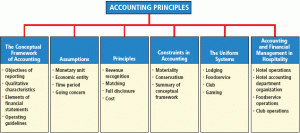Basic Principles of Accounting
Basic Principles of Accounting and Concepts are a set of broad conventions that have been devised to provide a basic framework for financial reporting. As financial reporting involves significant professional judgments by accountants, these concepts and principles ensure that the users of financial information are not mislead by the adoption of accounting policies and practices that go against the spirit of the accountancy profession.
GAAP contains a broad set of principles that have been developed by the accounting profession and the Securities and Exchange Commission (SEC).
You May Also like to Read
Accountants must therefore actively consider whether the accounting treatments adopted are consistent with the accounting concepts and principles.

Generally Accepted Accounting Principles – GAAP
The common set of accounting principles, standards and procedures that companies use to compile their financial statements. GAAP are a combination of authoritative standards (set by policy boards) and simply the commonly accepted ways of recording and reporting accounting information.
In order to ensure application of the accounting concepts and principles, major accounting standard-setting bodies have incorporated them into their reporting frameworks such as the IASB Framework.
Following is a list of the major
Basic Accounting Principles and Concepts:
- Relevance
- Reliability
- Matching Concept
- Timeliness
- Neutrality
- Faithful Representation
- Prudence
- Completeness
- Single Economic Entity Concept
- Money Measurement Concept
- Comparability/Consistency
- Understandability
- Materiality
- Going Concern
- Accruals
- Business Entity
- Substance over Form
- Realization Concept
- Duality Concef
